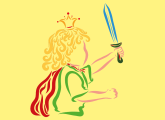Continuing her series on Human Tendencies, Barbara Isaacs examines our innate drive to explore…
In the past three issues I have explored Montessori’s view of human tendencies – the genetic drive that guides children towards development. These tendencies can be observed in all human behaviours and are relevant to our understanding of how to support children in their learning. So far I have examined the human tendency for orientation, which helps us to organise and guide our daily actions in a practical sense. Young children begin by organising the impressions of the world they receive through their senses, as they form mental structures and schematic behaviours. We also orientate ourselves in relations to the physical features of the world. Nomads provide us with an excellent example of the human skills of orientation in landscape. Their skills have been developed and refined through experience, and are a key feature of their culture – their close relationships with the landscape through which they travel.
We also orientate ourselves emotionally. The predictability of carers’ routines guides the emotional wellbeing of young babies and toddlers. It helps them to develop trust and contributes to their understanding of human relationships.
Our ability to communicate through body as well as oral and written language further enhances the unique aspect of being a human. Recent advancements in communication via the World Wide Web have made a significant contribution to global communication and have challenged our perceptions of many aspects of our lives. Communication also makes a significant contribution to our cultural experiences of the world.
This time I would like to examine the human tendency for exploration, which is manifested in all humans by their curiosity and inquisitiveness, and is at the forefront of human creativity. As with the other human tendencies it manifests itself from the moment of birth, and, some would say, even before as the infant explores the womb through involuntary movements.
Newborn babies learn about the world through their mouths as they taste not only the milk that provides physical nourishment but also the taste of their own bodies – be it fingers or feet – and that of any other object that comes within their reach. They explore their immediate environment by slithering on the floor, rolling over and reaching out; original instincts develop into intentional movements. The world becomes a very different place as the infant pulls him/herself up into a standing position and tries out first steps towards greater physical independence. The home environment offers the toddler so many new and rich experiences both inside and outside – the senses are stimulated to the full for the child who is given the opportunities to explore in safe, yet interesting surroundings. Caring adults or older siblings usually add to this experience by providing relevant verbal commentary, which nurtures the child’s experiences further.
Language offers a new element to the child’s exploration of the world. This is the stage when symbolic behaviours start to be evident in children’s play and pretend play comes to dominate play scenarios. This is also the time when problem solving and creative thinking emerges, and we often witness this though processes in the children’s monologues as they comment on what they are doing. Having access to open-ended resources gives young children real opportunities to extend their exploration into creative thinking. This is also an opportunity for the adult to get to know the child’s cognitive capacities. Emotional foundations are revealed as social interaction take on a new meaning; according to Montessori the child is entering the sensitive period for social aspects when social conventions of his/her culture, as well as growing awareness of others, come to the fore and empathy emerges.
The period of life from two-and-a-half to six years of age is such a rich ground for exploration from all aspect of experience. This is often the time when the child is not held back by realities or limitations of logical thinking – anything is possible and is to be explored. Children take on the roles of others ‘at a drop of a hat’ or, should I say, ‘by putting on a hat’. Props become the keys to their exploration and will guide them, with some sensitive support from adults, to new worlds. These worlds give them opportunities for control, manipulation and embellishment, all influenced by their experiences and culture, as well as their levels of maturation and guidance from others.
It is my belief that the human tendency for exploration really blossoms at this age, and it is our responsibility, as adults, to facilitate it. We can do this by ensuring children have time to engage and explore their ideas, so that imagination and creative thinking begins to flow, demonstrating all real potentialities within each child.
“I can never thank you enough for the happiness and fulfillment my career is giving me.”
For inspirational part-time, distance learning & continued professional development courses on Montessori, visit montessori.org.uk/mci_training

Why play is essential to early childhood development
Editors picks
